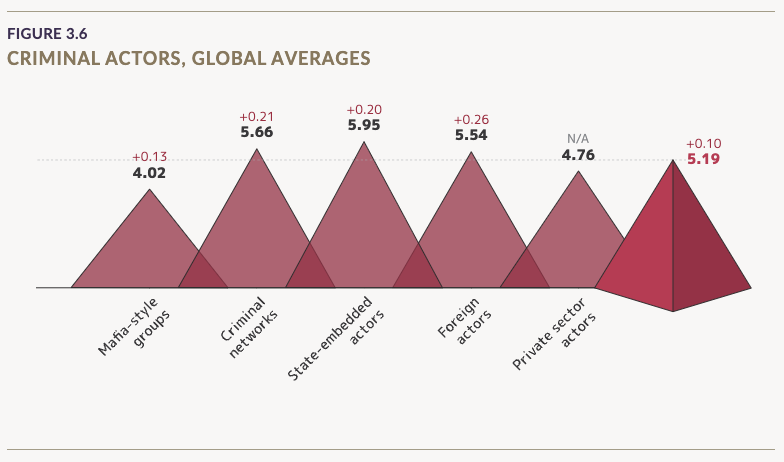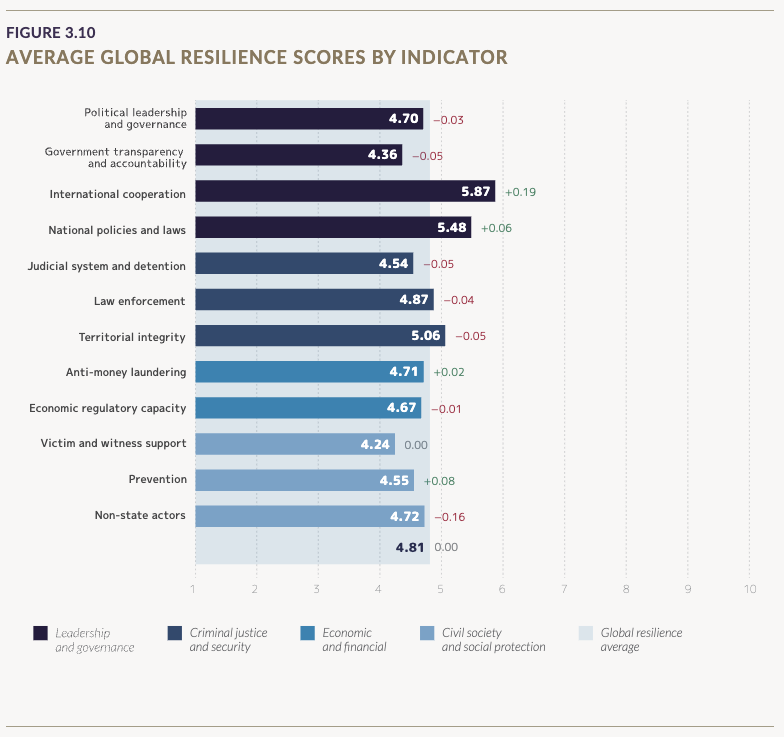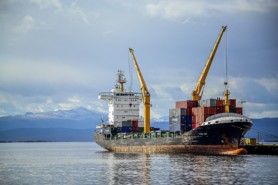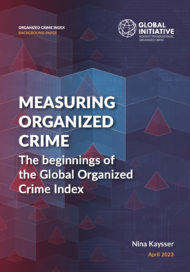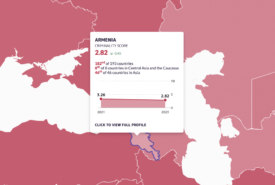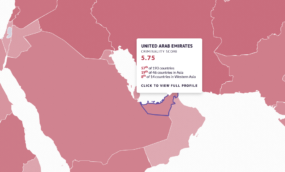Event Details
Posted on 01 Jul 2024
Every July, governments gather at the UN High-level Political Forum on Sustainable Development (HLPF). Since 2015, the aim of the sessions has been to review progress made on the UN’s Sustainable Development Goals (SDGs). This year, states will be discussing goal 16 (‘peace, justice and strong institutions’), which includes target 16.4: ‘By 2030, significantly reduce illicit financial and arms flows, strengthen the recovery and return of stolen assets and combat all forms of organized crime.’
The UN has found it difficult to measure progress made on this target. The target alone has four goals that each require a heavy lift response-wise. The UN does not even have an indicator for combating ‘all forms of organized crime’ – but the Global Organized Crime Index can provide some insight. Some of the key findings from the 2023 edition suggest that efforts to combat organized crime must be holistic and address criminal links to the state and global financial systems.
An assessment gap
The UN secretary-general’s report on SDG implementation for 2024 provides a global overview of progress made since 2015. The report notes that methodologies and data for many of the goals are lacking, and that significant gaps remain in ‘priority development areas’, such as gender equality, climate action, and peace, justice and strong institutions. The report makes no mention of target 16.4, however.
Last year, various UN bodies published a report on progress towards SDG 16, which found that ‘countries are backsliding on their human rights obligations, violence and insecurity are pervasive, corruption and unresponsive governments corrode weakened social contracts and justice continues to be elusive for the most marginalized’. The report makes reference to the difficulties in accessing data.
And in 2022, the Global Initiative Against Transnational Organized Crime (GI-TOC) published a report with other civil society partners that concluded that it is difficult to measure progress towards target 16.4, citing issues with both the indicators and official data.
Quantifying and measuring how initiatives prevent and counter organized crime is a complex process. The Global Organized Crime Index, which assesses the level of criminality and resilience to organized crime for 193 countries, attempts to fill this gap. However, its 2023 findings paint a bleak picture: criminal markets are expanding and current efforts to combat organized crime are weak.
A holistic response
When examining progress in combating organized crime, as the HLPF is set to do, two trends highlighted by the Index are worth noting. The first is that state-embedded actors are the most prevalent criminal actor type globally (as assessed by the Index methodology). In fact, state embedded actors’ influence is shown to have increased against the 2021 findings.
The second trend is that financial crime has become the most pervasive market globally, ranking among the three most significant criminal markets in every continent besides the Americas, where it is one of the five most prominent. Under the Index, financial crime refers to organized crime that results in a financial loss to the state, an entity or private individuals through fraud, tax evasion, embezzlement or misuse of funds.
The links between governance, the economy and organized crime require a holistic approach to responses. While mafia-style groups continue to be the framework around which responses to organized crime are formulated, the Index indicates that responses need to take into account the wider web of actors involved – and, crucially, those who are part of the state apparatus. This is undoubtedly one of the most critical issues to tackle, not least because state actors control the levers of response.
These two trends pose obvious risks to development and efforts to combat organized crime. Financial crimes siphon money from public coffers and hinder the ability of legitimate businesses to operate and contribute to society. They make a few very wealthy while impoverishing the rest. However, the wealth they generate, and the power that comes with it, is a disincentive to change the way things are done. When state actors profit from organized crime, it not only inhibits effective responses, but also erodes public trust in institutions and governance.
Tackling specific areas where resilience was found to be low in the Index could go a long way towards reducing the ability of state-embedded actors to engage in organized crime. Deficiencies in transparency and accountability as well as in governance can impede government pledges to confront crime and corruption.
Under the Index, scores for the resilience indicators ‘political leadership and governance’ and ‘government transparency and accountability’ declined globally over the last two years, with the latter identified as the second lowest indicator on average.
The two economic-focused resilience indicators, ‘anti-money laundering’ and ‘economic regulatory capacity’, score just below the global resilience average. A well-regulated economic sector serves to support legal economic development and impede organized crime’s access to legitimate markets.
The networked nature of organized crime requires a response that cuts across all key sectors. The Index shows that responses that fail to address organized crime’s political and economic linkages will not be effective in the long term. In comparing the rising levels of criminality against resilience, the Index helps paint a picture of the problem, but also points towards where policy-setting efforts should be directed. As governments gather to account for progress made on sustainable development, they will need a holistic lens to determine a way forward for target 16.4.
GI-TOC will cohost a Side Event at HLPF on SDG 16 and Organized Crime: Building Better Responses on 8 July, 2024
This Year’s HLPF will address SDG Goal 16: Promote peaceful and inclusive societies for sustainable development, provide access to justice for all and build effective, accountable and inclusive institutions at all levels.
Not only is there a concrete target to significantly reduce and combat organized crime, arms, and illicit financial flows directly (16.4) but nearly all targets in SDG 16 require combatting organized crime and the harms it causes for peaceful societies and effective rule of law and justice.
Reinforcing HLPF’s attention to SDG 16 and organized crime this year is the debate held at the Security Council in December 2023 on transnational organized crime and the newly designated International Day for the Prevention of and Fight against All Forms of Transnational Organized Crime. This side event will contribute to the broader UN discussions on organized crime this year, while focusing on the impacts it has on sustainable development. Participants will hear from governments, UN agencies, and civil society organizations about the strategies they employ to address organized crime’s impact on development and support the SDGs.
Welcome Remarks
- Permanent Representative, Ambassador Leonor Zalabata, Permanent Mission of Colombia to the UN
-
Deputy Permanent Representative, Ambassador Yamanaka Osamu, Permanent Mission of Japan to the UN
- First Secretary, Julia Eberl, Permanent Mission of Austria to the UN
Panel
- SDG 16 Support Strong Institutions & Rule of Law, with a focus on poverty:
Jairo Acuña–Alfaro, Team Leader, Governance, Latin America and the Caribbean, UNDP - SDG 16.4 Towards a more strategic response to reduce organized crime:
Mark Shaw, Director, Global Initiative Against Transnational Organized Crime - SDG 16 Promote peaceful and inclusive societies for sustainable development:
Delphine Schantz, Director of UNODC Liaison Office in New York, UNODC - SDG 16.1 Violence reduction, organized crime and peaceful societies:
Mauricio Vieira, Chair on Countering Illicit Trade and Preventing Transnational Organized Crime, University for Peace - SDG 16.2 Strong legislation, innovative responses and partnerships to protect children:
Bindu Sharma, Managing Director, Asia Pacific, International Centre for Missing & Exploited Children
Moderator
Summer Walker, Head of Security and Rights Initiatives, Global Initiative Against Transnational Organized Crime
